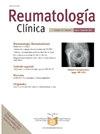Cognitive dysfunction in systemic lupus erythematosus: Insights from a two-year longitudinal study in a Brazilian cohort
IF 1.3
Q4 RHEUMATOLOGY
引用次数: 0
Abstract
Objectives
The objective of this study was to examine cognitive dysfunction in a Brazilian sample of SLE patients for two years.
Methods
A sample of 50 individuals with SLE was assessed at baseline for epidemiological and treatment data, disease activity by SLEDAI 2K (SLE disease activity 2000), cumulative damage by SLICC/ACR DI (Systemic Lupus International Collaborating Clinics/American College of Rheumatology Damage Index), depression by CES-D (Center for Epidemiological Studies-Depression) and cognitive function through MoCA (Montreal Cognitive Assessment). The same assessment was repeated after two years.
Results
The prevalence of cognitive impairment at baseline was 68%. The baseline cognitive assessment showed impairment in visuospatial/executive function (p = 0.002), naming (p = 0.04), attention (p < 0.0001) and delayed recall (p < 0.0001). The median MoCA results did not change in two years (p = 0.45), but 6 individuals (12%) that had normal cognitive function at baseline developed mild cognitive impairment and two (4%) that had mild cognitive impairment, improved. When considering the MoCA domains the only significant difference was improvement in abstraction (p = 0.001). No correlations between MoCA delta (difference between second and first value) and delta SLEDAI, delta SLICC and delta CES-D were found (all with p > 0.05). Also, no associations were found with used treatment or autoantibodies profile.
Conclusions
Cognitive dysfunction in SLE is dynamic and may require periodic re-assessments. Changes in cognition were not associated with disease activity, depression or cumulative damage in this sample.
系统性红斑狼疮的认知功能障碍:来自巴西一项为期两年的纵向研究的见解
本研究的目的是研究巴西SLE患者两年的认知功能障碍。方法50例SLE患者在基线时进行流行病学和治疗资料评估,疾病活动性通过SLEDAI 2K (SLE疾病活动性2000)评估,累积损害通过SLICC/ACR DI(系统性狼疮国际合作诊所/美国风湿病学会损伤指数)评估,抑郁通过CES-D(抑郁症流行病学研究中心)评估,认知功能通过MoCA(蒙特利尔认知评估)评估。两年后又进行了同样的评估。结果基线时认知障碍患病率为68%。基线认知评估显示视觉空间/执行功能(p = 0.002)、命名(p = 0.04)、注意力(p <;0.0001)和延迟召回(p <;0.0001)。MoCA的中位数结果在两年内没有变化(p = 0.45),但6名(12%)基线认知功能正常的患者出现轻度认知障碍,2名(4%)轻度认知障碍患者出现改善。当考虑MoCA域时,唯一显著的差异是抽象的改善(p = 0.001)。MoCA δ(二值与一值之差)与δ SLEDAI、δ SLICC和δ CES-D之间无相关性(均为p >;0.05)。此外,未发现与使用的治疗方法或自身抗体谱相关。结论SLE患者的认知功能障碍是动态的,可能需要定期重新评估。在这个样本中,认知的改变与疾病活动、抑郁或累积损伤无关。
本文章由计算机程序翻译,如有差异,请以英文原文为准。
求助全文
约1分钟内获得全文
求助全文
来源期刊

Reumatologia Clinica
RHEUMATOLOGY-
CiteScore
2.40
自引率
6.70%
发文量
105
审稿时长
54 days
期刊介绍:
Una gran revista para cubrir eficazmente las necesidades de conocimientos en una patología de etiología, expresividad clínica y tratamiento tan amplios. Además es La Publicación Oficial de la Sociedad Española de Reumatología y del Colegio Mexicano de Reumatología y está incluida en los más prestigiosos índices de referencia en medicina.
 求助内容:
求助内容: 应助结果提醒方式:
应助结果提醒方式:


